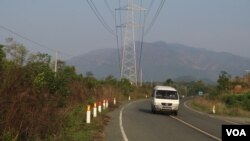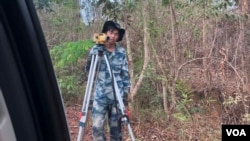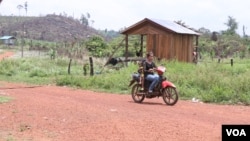There will be a road here, built by a Chinese state-run company, that will connect remote villages in Veal Veng district to the coastal Koh Kong province to the southeast and to the agriculturally rich district of Samlot in Battambang province to the north.
“They [Chinese workers] go back and forth to survey [the road] here,” said So Virak, a 37-year-old villager who owns a plot of land in Ousom commune.
“It is good to have a road for transportation,” he said, adding that the road here is unsuitable to transport crops from the area to other provinces. However, he said he is also concerned that the new road will affect his land when built.
“If it affects my land, all will be gone since my land is small,” he said.
Sitting nearby, another villager, Sar Sophan, 33, shares Virak’s concerns.
“We don’t know the impacts. We don’t know if the road will impact our land partly or completely. We don’t know,” he said. “I am afraid that the road will encroach on my land.”
Ask them about whether the road is part of China’s “Belt and Road initiative” and they said they have no idea.
“I don’t know. The important thing is that the government is the one who manages it. Belt or not belt is not important, what matters is that there is a road and we are happy,” said Sophan.
Chinese workers are busy hauling land surveying equipment to Samkos mountain, the second highest peak in Cambodia, located within the Phnom Samkos Wildlife Sanctuary in the Western Cardamom Mountains.
In June last year, Prime Minister Hun Sen who has ruled the country for more than three decades said a road would be built by the Chinese, adding that it might cost at least $200 million.
Va Sim Soriya, Ministry of Public Works and Transport spokesman, said this road project has been studied by a Chinese state-run company.
Cambodia’s Bold Commitment
Cambodia is the beneficiary of China’s massive Belt and Road Initiative, which was announced by Chinese president Xi Jinping in 2013. Cambodia, a close ally of Beijing, has made the initiative a central part of policy planning.
In order to boost tourism to welcome Chinese tourists, the government in 2016 published a “White Paper on China Ready for Cambodia Tourism” as the country welcomed around two million Chinese tourists in 2018, with an annual inflow of about 8 million expected by 2030.
Cambodia has seen a surge in Chinese investment in hotels and real estate to accommodate the Chinese tourists who have flocked to Sihanoukville’s rowdy nightlife and casinos.
Sihanoukville’s rapid transformation comes amid a global push back against China’s Belt and Road Initiative, with growing concern Beijing is practicing “debt-trap diplomacy”.
‘Not a Debt Trap’
Cambodian officials say benefits outweigh the costs of the initiative and it is not “a debt trap” as critics have suggested.
In a discussion organized by the United Nations on April 3, which was attended by senior Cambodian officials, the diplomatic community, international organizations, academia, and think-tanks, Hem Vanndy, undersecretary of state at Ministry of Economy and Finance, claimed that Cambodia will not fall into the so-called “debt trap.”
“We treat the debts we contract under the BRI like any other debts, from multilateral and bilateral institutions in terms of due process, and the core underlying debt management principles, that they shall adhere to,” he said. “But BRI is not going to create a debt trap for Cambodia”.
Wang Yi, China’s state councilor and foreign minister, said on Friday that the BRI is not a geopolitical tool or a debt trap for participating countries, but a platform for cooperation.
He made the remark at a press conference ahead of the second Belt and Road Forum on International Cooperation, which will be held in Beijing from April 25-27.
Responding to Western criticism at another press conference last month, Wang pointed to the membership growth of BRI over the last six years, now at 123 countries, as a clear indicator of its economic benefits rather than negative impacts.
A second forum to be held this week, which will be attended by Hun Sen, is expected to draw an even larger crowd of participating members compared to the first forum, held in May 2017, and is partly aimed at addressing these concerns.
Sok Eysan, the spokesman for the ruling Cambodian People's Party (CPP), called the BRI “the global development policy of China” which he said Cambodia’s government was committed to.
“Cambodia has a high responsibility for foreign loans. The loans are now at just 22 percent of GDP, while Cambodia can do up to 40 percent,” he said.
More than two-thirds of Cambodia’s $4.3 billion in bilateral debt is owed to China, according to the International Monetary Fund.
Hun Sen Travels to BRI Forum
Hun Sen will lead a high-level delegation to attend the forum and deliver a speech to share his perspective on “boosting connectivity to explore new sources of growth,” according to a press release dated April 22, issued by Cambodia’s Ministry of Foreign Affairs. The theme of the forum is "Belt and Road Cooperation: Shaping a Brighter Shared Future.”
Several documents on Chinese assistance and cooperation projects are expected to be signed during the visit.
Wang said Xi Jinping will deliver a keynote speech at the opening ceremony of the forum and chair the leaders' round-table summit.
At the April 4 meeting in Phnom Penh, Michael Newbill, chargé d’affaires at the US embassy, criticized the deals between Cambodia and China.
“When it comes to deals in Cambodia or anywhere else, it’s important for people to have the right and ability to review these deals to make sure everyone benefits and not just a few,” he said.
“Chinese investment can be beneficial, but these deals need scrutiny and close supervision to make sure the benefits go to the country, not the dealmakers. That’s the only way we can ensure that Cambodia is getting the best deal,” he added.
“There are many, very visible negative externalities that come with significant Chinese investments, namely the lack of transparency or accountability, the rise of corruption, and the export of Chinese vice,” added.
His comments prompted a stern response from the Chinese embassy in Cambodia.
The Chinese Embassy, in response, posted a statement on its Facebook page one day later, warning “Cambodian friends beware! The US is trying to stir things up again with the so-called trade deficit issue.”
Paul Chambers, a political analyst, and lecturer in Thailand's Naresuan University said in an email: “Turning Cambodia into a dependency represents just another part of the BRI policy of Chinese expansionism. Cambodia’s government needs to prevent itself from being drawn into this Beijing “quicksand” before It is too late—before Cambodia becomes straight-jacketed inside of China’s neo-colonialist ambition across the world.”











